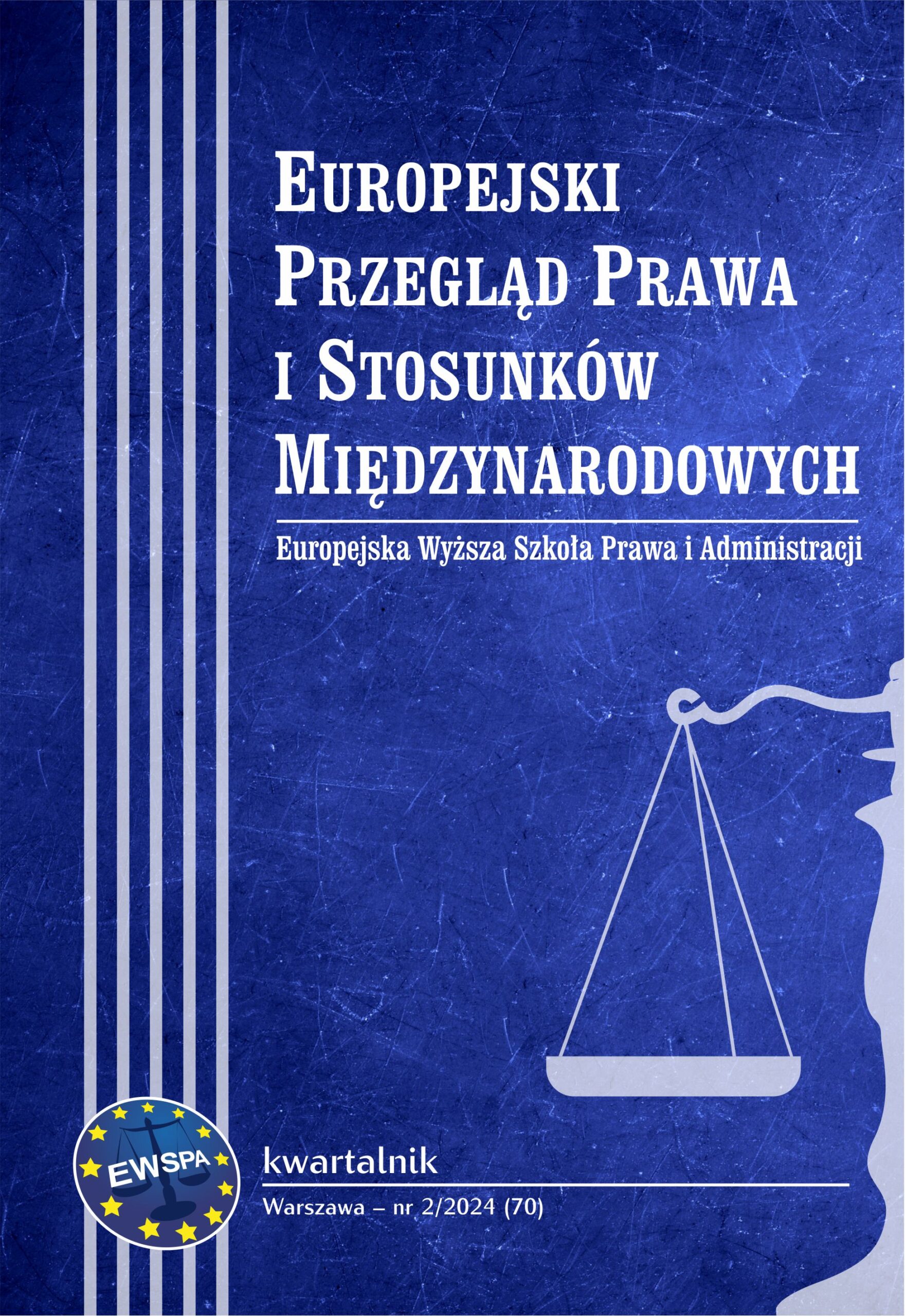Abstrakt
W lipcu 2016 r. Komisja Europejska, powołując się na dotychczasowe doświadczenia w zakresie przesiedleń uchodźców, przedstawiła wniosek ustawodawczy mający na celu stworzenie ram polityki UE w zakresie przesiedleń oraz zbudowanie wspólnego i bardziej skoordynowanego podejścia do dania osobom potrzebującym ochrony międzynarodowej możliwości bezpiecznego i legalnego przybycia do UE. W związku z tym powstało pytanie, czy rzeczywiście unijne inicjatywy przesiedleńcze z lat poprzedzających wniosek, a więc z lat 2003–2016, pozwoliły na zdobycie odpowiedniego doświadczenia i zarazem potwierdziły potrzebę zbudowania przez UE stałego mechanizmu przesiedleń uchodźców. Dokonana w artykule analiza obejmuje: unijne regionalne programy ochrony z 2005 r., doraźne programy przesiedleń uchodźców, ze szczególnym uwzględnieniem programów Irakijczyków w 2007 r.; ogólnoeuropejski program przesiedleń z 2009 r., programy rozbudowy i ochronie regionów z 2013 r.; pierwszy pilotażowy ogólnounijny program przesiedleń z 2015 r., wspólny program działań z Valletty i wreszcie program przesiedleń w ramach EU–Turkey deal z 2016 roku. Celem artykułu jest również ustalenie, czy inicjatywy przesiedleńcze UE z lat 2003–2016 realizowały dwie zasadnicze funkcje przesiedleń, a więc czy można je uznać za instrument ochrony uchodźców, których prawa podstawowe są zagrożone w kraju azylu, oraz czy miały na celu zapewnienie tym uchodźcom trwałego rozwiązania ich sytuacji. Aby osiągnąć cele badawcze, zastosowano metodę historycznoprawną. Umożliwi ona ukazanie podejścia państw członkowskich i samej UE do przesiedleń z perspektywy procesu historycznego i w konsekwencji pozwoli na wyodrębnienie lub skonkretyzowanie poszczególnych elementów tego podejścia i jego czasowych uwarunkowań.
Bibliografia
- Afanasieva D., Tagaris K., Migrants sent back from Greece arrive in Turkey under EU deal, „Reuters”, 2016, April 4, www.reuters.com/article/us-europe-migrants-greece-returns-idUSKCN0X107Q [accessed: 22.01.2024]. [Google Scholar]
- Apak H., A Comprehensive Analyses on the Eu–Turkey Statement, Bod Third Party Titles 2020. [Google Scholar]
- Betts A., Loescher G., Milner J. (eds.), The United Nations High Commissioner for Refugees (UNHCR): the Politics and Practice of Refugee Protection, Routledge 2012. [Google Scholar]
- Collett E., The Paradox of the EU–Turkey Refugee Deal, Commentaries, Migration Policy Institute, March 2016, www.reliefweb.int/ report/ world/ paradox-Eu-Turkey-refugee-deal. [Google Scholar]
- Ferris E. G., Kirisci K., The Consequences of Chaos: Syria’s Humanitarian Crisis and the Failure to Protect, The Brookings Institution 2016. [Google Scholar]
- Fischel de Andrade J. H., Regional Refugee Regimes: Latin America in the Oxford Handbook of International Refugee, Law Cathryn Costello (ed.) et al., Oxford 2021. [Google Scholar]
- Garnier A., Jubilut L. Lyra, Sandvik K. B., Refugee Resettlement: Power, Politics, and Humanitarian Governance, Berghahn 2018. [Google Scholar]
- Gatti M., The EU–Turkey Statement: A Treaty That Violates Democracy, Blog of the European Journal of International Law (2016); ejiltalk.org/the-eu-turkey-statement-a-treaty-that-violates-democracy-part-1-of-2/ [accessed: 22.01.2024]. [Google Scholar]
- Niederberger A., Göbel M, Cosmopolitan Norms and European Values Ethical Perspectives on Europe’s Refugee Policy, Routledge 2023. [Google Scholar]
- Perrin D., McNamara F., Refugee Resettlement in the EU: between shared standards and diversity in legal and policy frames, „Research Report KNOW RESET RR 2013/03, Building Knowledge for a Concerted and Sustainable Approach to Refugee Resettlement in the EU and its Member States”, https://cadmus.eui.eu/bitstream/handle/1814/29400/Know-Reset_RR-2013_03.pdf. [Google Scholar]
- Mandal R., EU–Turkey Refugee Deal Is Vulnerable to Legal Challenge, Chatham House 2016, March 23, ESO, www.chathamhouse.org/expert/comment/eu-turkey-refugee-deal-vulnerable-legalchallenge. [Google Scholar]
- Peers S., The final EU–Turkey refugee deal: a legal assessment, EU Law Analysis 2016, March 18, http://eulawanalysis.blogspot.it/2016/03/the-final-euturkey-refugee-deal-legal.html. Phillmann S., Stiennon A., A Report on Joint Resettlement in the European Union, ICMC and IRC, Brussels 2010, https://www.refworld.org/pdfid/4c971b8d2.pdf. Sharpe M., The Regional Law of Refugee Protection in Africa, Oxford 2018. [Google Scholar]
- Carp R., How Safe Shall Be a Third Country for Asylum-Seekers from a European Perspective? The Human Rights Implications of the EU–Turkey Deal and the Assessment of the ECHR/General Court, „Journal of Identity and Migration Studies” 2018, 12. [Google Scholar]
- Costello C., It need not be like this, „Forced Migration Review” 2016, 51. [Google Scholar]
- Feith Tan N., The End of Protection: „The Danish „Paradigm Shift” and the Law of Cessation”, „Nordic Journal of International Law” 2021, 90. [Google Scholar]
- Hashimoto N., Refugee Resettlement as an Alternative to Asylum 2018, Refugee „Survey Quarterly” 2018, 37. [Google Scholar]
- İçduygu A., Şimşek D., Syrian refugees in Turkey: Towards integration policies, „Turkish Policy Quarterly” 2016, 15. [Google Scholar]
- Kalicka-Mikołajczyk A., The concept of international agreement in European Union law – comments on the General Court’s order of 28.02.2017, T-192/16, NF v. European Council, „European Judicial Review” 2019, 12. [Google Scholar]
- Luedtke A., Crisis and Reality in European Immigration Policy, „Current History” 2015, 114. [Google Scholar]
- Półtorak M., European Agenda on Migration Towards Vulnerable Persons European Agenda on Migration Towards Vulnerable Persons, „Studia Migracyjne – Przegląd Polonijny” 2021, 2. [Google Scholar]
- Trojanowska-Strzęboszewska M., Border control strategies – determinants of change and their impact on the nature of contemporary borders, „Pogranicze. Polish Borderlands Studies” 2018, 6. [Google Scholar]
- Wilk W., The war in Syria and the humanitarian crisis, „Journalists Guide” (Polish Centre for International Aid) 2016, 24. [Google Scholar]
Słowa kluczowe
- uchodźcy
- przesiedlenia
- ochrona międzynarodowa
- UNHCR
- unijne programy przesiedleń
Jak cytować
Morawska, E. (2024). Podejście państw członkowskich UE do przesiedlania uchodźców: zdobyte doświadczenia i nowe wyzwania. Europejski Przegląd Prawa I Stosunków Międzynarodowych, (2), 25–44. https://doi.org/10.52097/eppism.9032
Prawa autorskie (c) 2024 Europejski Przegląd Prawa i Stosunków Międzynarodowych
Utwór dostępny jest na licencji Creative Commons Uznanie autorstwa 4.0 Międzynarodowe.

